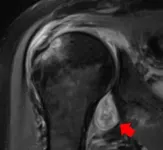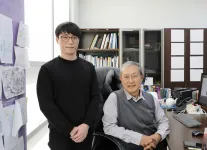Suppressive immune cells' metabolic vulnerability may be targeted for cancer immunotherapy
2021-02-17
(Press-News.org) FEBRUARY 15, 2021, NEW YORK - A Ludwig Cancer Research study has identified a novel mechanism by which a type of cancer immunotherapy known as CTLA-4 blockade can disable suppressive immune cells to aid the destruction of certain tumors. The tumors in question are relatively less reliant on burning sugar through a biochemical process known as glycolysis.
Researchers led by Taha Merghoub and Jedd Wolchok of the Ludwig Center at Memorial Sloan Kettering Cancer Center (MSK) and former postdoc Roberta Zappasodi--now at Weill Cornell Medicine--have discovered that in a mouse model of glycolysis-deficient tumors, CTLA-4 blockade does much more than stimulate cancer-targeting T cells of the immune system. In such tumors, anti-CTLA-4 therapy also destabilizes and reprograms regulatory T cells (Tregs), which suppress anti-cancer immune responses and often dull the effects of immunotherapies. Their report appears in the current issue of Nature.
"Our study shows that tumors with low levels of glycolysis are more likely to respond to CTLA-4 blockade," said Wolchok. "This suggests a new way to personalize anti-CTLA-4 therapy--by using it more selectively to treat patients with these types of tumors--and to improve its efficacy against highly glycolytic tumors by combining it with drugs that inhibit glycolysis."
Tumors are replete with metabolic adaptations that not only promote their growth, but also serve to cripple the immune cells that attack them. Among these is the tendency of cancer cells to consume large amounts of the sugar glucose through the abnormal employment of glycolysis. This depletes glucose from the tumor's microenvironment, depriving so-called "effector" T cells, like killer T cells, of a nutrient that happens to be essential to their anti-cancer activity.
"The immune cells and cancer cells are competing for glucose, and we wanted to understand that dynamic within the tumor microenvironment in the context of checkpoint blockade immunotherapy," said Wolchok.
This is of interest because, powerful though it is, CTLA-4 blockade often has a limited efficacy, and only against a few types of cancer. Researchers are exploring multiple strategies to boost the effects and broaden the applicability of the therapy, which blocks a protein named CTLA-4 on T cells that serves as an "off switch" to their activation.
Previous studies have shown that simply blocking glycolysis in tumors results in greater infiltration by immune cells. "So, we asked, if glycolysis-deficient tumors are now hot"--or filled with effector T cells--"can we get a better anti-cancer immune response with immune checkpoint blockade," said Merghoub.
To explore the phenomenon, Zappasodi, Merghoub, Wolchok and colleagues generated mouse models implanted with breast tumors deficient in glycolysis. They showed that CTLA-4 blockade and surgery significantly extended the survival of these mice compared to identically treated mice implanted with the unaltered and highly glycolytic tumors. The effect correlated with increased infiltration of T cells into the poorly glycolytic tumors and the establishment of a strong immune memory of the cancer in the mice bearing them.
But what really piqued the interest of the researchers was that the greater infiltration of T cells into the poorly glycolytic tumors extended to Tregs as well, not just the effector T cells that target cancer cells. Analysis of these Tregs showed that they were producing immune factors--interferon-γ and TNF-α--that are normally produced by killer T cells. This did not occur in highly glycolytic tumors.
"When we block CTLA-4, we destabilize the Tregs in glycolysis-deficient tumors," said Zappasodi. "But instead of making the Tregs disappear, the therapy reorients them, so they're not just in a non-suppressive state, but actually switch over to an effector state."
Through a series of sophisticated cell culture experiments, the researchers showed that tumor glycolysis reinforces the functional stability of Tregs to better protect their constituent cancer cells from immune attack. They also charted out the biochemical signaling that functionally destabilizes Tregs in an environment rich in glucose following CTLA-4 blockade.
"Our plan now is to look for drugs that reduce glycolysis within the tumor microenvironment and test their effects on CTLA-4 checkpoint blockade," says Merghoub.
INFORMATION:
This study was supported by Ludwig Cancer Research, Swim Across America, Parker Institute for Cancer Immunotherapy, The US National Cancer Institute, the Breast Cancer Research Foundation, the Swiss National Science Foundation and the European Research Council.
Taha Merghoub is co-director of the Ludwig Collaborative & Swim Across America Laboratory at MSK and professor of immunology research in medicine at Weill Cornell Medical College.
Jedd Wolchok is co-director of the Ludwig Center and the Ludwig Collaborative & Swim Across America Laboratory and chief of the immuno-oncology service, human oncology and pathogenesis program at MSK.
Roberta Zappasodi is an assistant professor of medicine at Weill Cornell Medicine.
About Ludwig Cancer Research
Ludwig Cancer Research is an international collaborative network of acclaimed scientists that has pioneered cancer research and landmark discovery for nearly 50 years. Ludwig combines basic science with the ability to translate its discoveries and conduct clinical trials to accelerate the development of new cancer diagnostics and therapies. Since 1971, Ludwig has invested $2.7 billion in life-changing science through the not-for-profit Ludwig Institute for Cancer Research and the six U.S.-based Ludwig Centers. To learn more, visit http://www.ludwigcancerresearch.org.
For further information please contact Rachel Reinhardt, rreinhardt@lcr.org or +1-212-450-1582.
[Attachments] See images for this press release:

ELSE PRESS RELEASES FROM THIS DATE:
2021-02-17
Durham, NC- Can stem cells alleviate lymphedema, a chronic debilitating condition affecting up to one in three women treated for breast cancer? Results of a phase I clinical trial released today in STEM CELLS Translational Medicine (SCTM) show there is a strong possibility that the answer is yes.
Lymphedema is swelling due to a build-up of fluid in lymph nodes - vessels that help rid the body of toxins, waste, and other unwanted materials- usually occurring in an arm or leg. While it can be the result of an inherited condition, its most common cause in the Western world is the removal of or damage to the lymph nodes during the course of cancer ...
2021-02-17
CHICAGO --- Muscle soreness and achy joints are common symptoms among COVID-19 patients. But for some people, symptoms are more severe, long lasting and even bizarre, including rheumatoid arthritis flares, autoimmune myositis or "COVID toes."
A new Northwestern Medicine study has, for the first time, confirmed and illustrated the causes of these symptoms through radiological imaging.
"We've realized that the COVID virus can trigger the body to attack itself in different ways, which may lead to rheumatological issues that require lifelong management," said corresponding author Dr. Swati Deshmukh.
The paper will be published Feb. 17 in the journal Skeletal Radiology. The study is a retrospective review of data from patients who presented to Northwestern Memorial Hospital between ...
2021-02-17
A woman's body shape--not only the amount of fat--is what drives stigma associated with overweight and obesity.
Fat stigma is a socially acceptable form of prejudice that contributes to poor medical outcomes and negatively affects educational and economic opportunities. But a new study has found that not all overweight and obese body shapes are equally stigmatized. Scientists from Arizona State University and Oklahoma State University have shown that women with abdominal fat around their midsection are more stigmatized than those with gluteofemoral fat on the hips, buttocks and thighs. The work will be published on February 17 in Social Psychology and Personality Science.
"Fat stigma is pervasive, painful and results ...
2021-02-17
To provoke more interest and excitement for students and lecturers alike, a professor from Florida Atlantic University's College of Engineering and Computer Science is spicing up the study of complex differential mathematical equations using relevant history of algebra. In a paper published in the Journal of Humanistic Mathematics, Isaac Elishakoff, Ph.D., provides a refreshing perspective and a special "shout out" to Stephen Colbert, comedian and host of CBS's The Late Show with Stephen Colbert. His motivation? Colbert previously referred to mathematical equations as ...
2021-02-17
Children are protected from severe COVID-19 because their innate immune system is quick to attack the virus, a new study has found.
The research led by the Murdoch Children's Research Institute (MCRI) and published in Nature Communications, found that specialised cells in a child's immune system rapidly target the new coronavirus (SARS-CoV-2).
MCRI's Dr Melanie Neeland said the reasons why children have mild COVID-19 disease compared to adults, and the immune mechanisms underpinning this protection, were unknown until this study.
"Children are less likely to become infected with the virus and up to a third are asymptomatic, which is strikingly different to ...
2021-02-17
A new study, published in Bioscience, considers the future of ecology, where technological advancement towards a multidimensional science will continue to fundamentally shift the way we view, explore, and conceptualize the natural world.
The study, co-led by Greg Asner, Director of the Arizona State University Center for Global Discovery and Conservation Science, in collaboration with Auburn University, the Oxford Seascape Ecology Lab, and other partners, demonstrates how the integration of remotely sensed 3D information holds great potential to provide new ecological insights on land and in the oceans.
Scientific research into 3D digital applications in ecology has grown in the last decade. Landscape ...
2021-02-17
With every passing day, human technology becomes more refined and we become slightly better equipped to look deeper into biological processes and molecular and cellular structures, thereby gaining greater understanding of mechanisms underlying diseases such as cancer, Alzheimer's, and others.
Today, nanoimaging, one such cutting-edge technology, is widely used to structurally characterize subcellular components and cellular molecules such as cholesterol and fatty acids. But it is not without its limitations, as Professor Dae Won Moon of Daegu Gyeongbuk Institute of Technology (DGIST), Korea, lead scientist in a recent groundbreaking study advancing the field, explains: "Most advanced nanoimaging techniques use accelerated electron or ion beams ...
2021-02-17
Messenger RNA (mRNA) vaccines to prevent COVID-19 have made headlines around the world recently, but scientists have also been working on mRNA vaccines to treat or prevent other diseases, including some forms of cancer. Now, researchers reporting in ACS' Nano Letters have developed a hydrogel that, when injected into mice with melanoma, slowly released RNA nanovaccines that shrank tumors and kept them from metastasizing.
Cancer immunotherapy vaccines work similarly to mRNA vaccines for COVID-19, except they activate the immune system to attack tumors instead of a virus. These vaccines contain mRNA that encodes proteins made specifically by tumor cells. When the mRNA enters antigen-presenting cells, they begin making the tumor protein and displaying it on their surfaces, ...
2021-02-17
Swimming in indoor or outdoor pools is a healthy form of exercise and recreation for many people. However, studies have linked compounds that arise from chlorine disinfection of the pools to respiratory problems, including asthma, in avid swimmers. Now, researchers reporting in ACS' Environmental Science & Technology have found that using a complementary form of disinfection, known as copper-silver ionization (CSI), can decrease disinfection byproducts and cell toxicity of chlorinated swimming pool water.
Disinfecting swimming pool water is necessary to inactivate harmful pathogens. Although an effective ...
2021-02-17
Washington, February 17, 2021--As higher education institutions worldwide transition to new methods of instruction, including the use of more pre-recorded videos, in response to the COVID-19 pandemic, many observers are concerned that student learning is suffering as a result. However, a new comprehensive review of research offers some positive news for college students. The authors found that, in many cases, replacing teaching methods with pre-recorded videos leads to small improvements in learning and that supplementing existing content with videos results in strong learning benefits. The study ...
LAST 30 PRESS RELEASES:
[Press-News.org] Suppressive immune cells' metabolic vulnerability may be targeted for cancer immunotherapy






